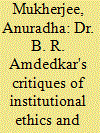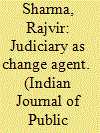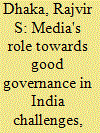|
|
|
Sort Order |
|
|
|
Items / Page
|
|
|
|
|
|
|
| Srl | Item |
| 1 |
ID:
130808


|
|
|
|
|
| Publication |
2014.
|
| Summary/Abstract |
Ethics and morality are the milestones of civilization in the true sense of the term. These concepts again are not static but evolve with greater implications and subtler nuances as humanity strives to grow towards perfection- the ultimate end of existence. ' whether biologically or spiritually. In the context of Indian thought, the traditional, age-old dictums of ethics and morality. having undergone numerous interpretations and changes have experienced a new set of values,' however latent in the traditional interpretation of Dharma or Niri- with the advent of" nationalism, the emergence of a new nation-state and the concurrent vision of human rights. The Constitution of India fully recognizes the moral as at par with the modem, that is, the western ideals of morality in the realization that in the context of Dalit uprising in modern India, the traditional ideals of ethics and morality are to be reviewed. Obviously this shows that what is legal should be ethical and moral or rather. what is ethical and moral tnust have its place in law. It is from this perspective that the modern-day Dalit struggle against injustices, age-old as they are. are to be seen and Dr.B.R. Ambedkar's initiation to this struggle was aimed at bringing ethics and morality to work at the state level, subjugating the Nili forest while lawgivers to take a backseat before the universal laws of morality. To understand Ambedkar's stand on the place of ethics and morality in Hinduism, one must see the reasons that made him strike out at the roots of Hindu social ethics. The Hindu social life was traditionally ruled by Dilemma. Dharma guided a Hindu's'Iife from birth to death by a set of rules strictly laid out for everyone in society. The observation of these rules was morality and the underlying ethics of these duties and rights was ?rst ofall, societal good, i.e., good for 'all. The second part of this ethics was that by observing this social morality, an individual will attain perfection. In accordance with these concepts, the Dharmas/zastras dictate the functions ofthe state and the king. The Nili and Dandanili emanate from one source and with one ideal- that is to maintain the social order by arranging for the speci?c duties of each and every member of society. Consequently. rights came as group rights and institutional rights as laid out in the Dharamshastra'. And over and above everything was the belief in the law of Karma that sanctified the rule of l/Z7I'l7aS/1I'uII7(l, or ones station in life as prescribed by onc's birth. These two essential features of Hindu society made it a highly stratified one so that the passage of' centuries only tightened the rules and the rituals pertaining to these two rules. The solemn and noble hymns of Rigveda. where the philosophy of Vedic seers and poets as the world being one and where everyone was the other's kin. I Va.t'zzdlmibu Kzzrumba/(um )' is the spirit of the ancient Indian Vedic realization. The utmost ideals of human dignity with the universal ethics of righteous behavior and the universal morality of conscientious behavior were preached in their fullest glory. . '
|
|
|
|
|
|
|
|
|
|
|
|
|
|
|
|
| 2 |
ID:
124507


|
|
|
|
|
| Publication |
2012.
|
| Summary/Abstract |
The Indian Judiciary has completed 60 years of its existence and has made long lasting contribution to the system of governance that has impacted the life of the people and the nation. In many ways, it has impacted the nature, scope and processes of public governance and can claim credit for expanding the meaning of the constitution in favor of different segments, especially the poor, of the society. It has strengthened Indian federation, catalyzed goal achievement, deepened democracy and defended people against excesses of the State. It has acted as a promoter of peace, cordiality and balance and coordination between different organs of the government. At one time it was thought that the role of judiciary is only to interpret the laws and the regulations and provide judgements exclusively from the legal point of view. This perspective has undergone a sea change in the recent times. Envisaging the role of the supreme court of India, the first Chief Justice of India, Justice Kania said:
"The Supreme Court would declare and interpret the law of the land, and with the tradition of Indian judiciary, it would work in no spirit of formal or barren legalism, within the limits prescribed by the constitution. The court, as part of the federal system and as the defender of democracy, is responsive to the changes in Indian society
|
|
|
|
|
|
|
|
|
|
|
|
|
|
|
|
| 3 |
ID:
124505


|
|
|
|
|
| Publication |
2012.
|
| Summary/Abstract |
Good governance has a wide connotation; it is synonymous with securing justice, empowerment, employment and efficient delivery of services. It is also referred to as the quality of relation between market, state and civil society. Accountability, transparency, predictability and participation, are considered to be the four key components of good governance. Achieving good governance requires the understanding and participation of every member of the society. The media, their roles, channels and contents, are considered powerful enough to make this achievement a reality.
|
|
|
|
|
|
|
|
|
|
|
|
|
|
|
|
|
|
|
|
|